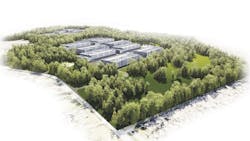Active Infrastructure Eyes Pro-Hydrogen Data Center Campus Behind-the-Meter in Northern Virginia's Leesburg
New York-based hyperscale and colocation data center developer Active Infrastructure is proposing a 362-acre data center campus in Leesburg, Virginia that would include significant on-site clean energy generation resources, including a microgrid, hydrogen fuel cells and a battery system for energy storage.
Located along Evergreen Mills Road about 8 miles south of Leesburg, the proposed Spring Valley Technology Park could include up to 3.5 million sq. ft. of data centers.
Pre-application documents provided to the Washington Business Journal in October by DLA Piper LLP, identified as Active Infrastructure’s land use attorney, said the developer is preparing to submit a rezoning application to enable the project.
Environmentally Conscious On-site Power Generation Strategy
Per the documents, among other “environmentally conscious” benefits, the project's early-stage plans include, “natural gas-powered hydrogen fuel cells that generate electricity without combustion, creating a low- or zero-emissions microgrid.”
The documents also propose a battery system that would “stabilize the electrical grid and enhance resiliency" by providing electricity back into the grid.
According to the reporting, the documents also propose a battery system that would “stabilize the electrical grid and enhance resiliency, ensuring a steady stream of power capacity back into and available to the larger grid.”
Loudoun County has been encouraging developers to consider on-site power as a way to reduce grid transmission bottlenecks. Several elements of the proposal align with a recent white paper from Supervisor Michael Turner.
Active Infrastructure says it is "pursuing best-in-class data center and energy innovations directly addressing priorities outlined in this aspirational document."
The Leesburg project is the latest to embrace hydrogen fuel cells, following recent announcements from ECL in California and Texas. Active Infrastructure plans to initially use natural gas (known as "blue hydrogen") as its source.
White Paper
This past summer, Northern Virginia's Loudoun County clamped certain governmental restrictions on data centers, involving a 7-2 Board of Supervisors vote in July calling for removal of data centers as a "by-right" use across all county zones and properties. (Data Center Dynamics' Georgia Butler has provided detailed reporting on this topic.)
Shortly before the July vote, Ashburn District Supervisor Michael R. Turner (who participated as a speaker at last month's DCF Trends Summit in the conference's panel devoted to on-site power generation) publicly released publicly released one the year's more controversial and influential data center industry advisories in his white paper entitled: “Loudoun County Virginia: Data Center Capital of the World, A Strategy for a Changing Paradigm” (PDF).
Supervisor Turner's reckoning in the document is that as the world's largest hyperscale and colocation data center market, industry-leading Loudoun County, also threatens the areas power grid with "oversubscription," a contention with which local utility Dominion Energy disagrees.
Turner's white paper recommends that, as wind and solar renewable energies are also bounded in scope, data centers should marshal on-site power sources "behind the meter" such as hydrogen, battery storage and microgrids, natural gas and emerging nuclear SMR technologies.
Active Infrastructure's proposal for the Leesburg data center project says it aims to deliver on “key objectives” that Supervisor Turner's paper outlines.
In original reporting on Oct. 18, Washington Business Journal's Dan Brendel aptly characterized the situation:
Active Infrastructure’s proposal comes on the heels of a nascent effort to enhance Loudoun County’s legal authority to block data center developments based on their electricity consumption, spearheaded by Supervisor Mike Turner, D-Ashburn, a leading data center critic [...] The project narrative explicitly cites an updated version of a white paper on the subject that Turner first published in June, in which he posits that insatiable data center demand puts at risk the resiliency of the whole grid, and all the other commercial and residential customers who depend on it. The proposal says it aims to deliver on “key objectives” that the paper outlines.
A formal legislative proposal is likely forthcoming in the next year or so that would require data centers to supply at least some of their own power on-site rather than by hooking into the grid, which Turner fears is “oversubscribed.” [...] Dominion Energy Inc. has disagreed with that characterization in the past, saying it doesn’t hook new customers into the grid if that causes a strain, but rather makes customers wait until the grid is sufficiently expanded to handle the new demand.
Nearly Net Zero Campus
On its LinkedIn page, Active Infrastructure confirmed news of its Leesburg data center campus project, while revealing further details:
We are excited to announce that we have commenced the approval process to develop Spring Valley Technology Park (SVTP), our first data center campus in Loudoun County, Virginia.
Intentionally planned to be concealed and have minimal visual impact on the surrounding community, SVTP will incorporate unprecedented design features, including dense mature forest setbacks ranging from 200 to over 1,000 feet and over 60% open-space.
We are also proud to propose the first data center campus to incorporate innovative technologies into its design, including on-site large-scale low- to zero-emission electricity generation and a utility scale battery energy storage system.
More information on this development will be released as the project advances through the County’s review process.
Our team looks forward to advancing this cutting-edge development that will incorporate both community and local government feedback, ensuring it will be an asset to Loudoun County while maintaining a low-impact footprint.
According to its website, Active Infrastructure is mainly active in three tier 1 U.S. data center markets: North Virginia; Columbus, Ohio; and Phoenix, Arizona.
The firm deals in joint venture partnerships, M&A advisory, sale of entitled land and development support services, turn-key leasing of speculative-powered shell buildings, and end-user build-to-suit development.
Location Concerns
Meanwhile, as the proposed campus will initially rely on at least some grid-supplied power, the firm's application letter noted that the integrated campus as proposed is located less than one mile from Dominion’s critical 500kV and 230kV transmission infrastructure, positioned just east of the application site.
In his reporting, Bizjournal's Brendel issued an uncomfortable forecast for the Active Infrastructure project in Leesburg:
The proposed location on the fringe of rural Loudoun, characterized by single-family homes on big lots, farms and woods, will almost certainly raise controversy.
The county’s 2019 comprehensive plan assigns the site a Transition Large Lot Neighborhood “place type," which envisions predominantly low-density housing — think detached homes on up to 10 acres each — and certain agriculture and commercial uses as “complementary,” but not data centers.
“The Applicant acknowledges that the TLLN Place Type may not be the typical location for data centers,” per the pre-application project narrative.
About the Author
Matt Vincent
A B2B technology journalist and editor with more than two decades of experience, Matt Vincent is Editor in Chief of Data Center Frontier.



